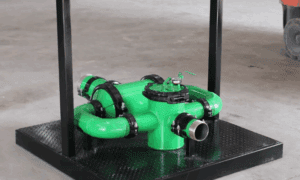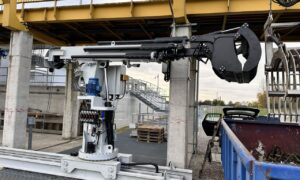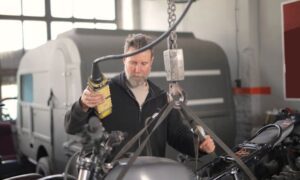In the modern era, security threats to military bases and checkpoints have grown increasingly sophisticated. One of the most pressing concerns is the potential for unauthorized vehicle incursions, which can lead to catastrophic breaches of security. To mitigate this risk, security systems at these high-risk facilities are equipped with robust barriers, among which hydraulic road blockers stand out as a crucial line of defense.
Hydraulic road blockers are designed to prevent unauthorized vehicles from gaining access to secure areas. Their integration with advanced hydraulic systems and durable materials makes them reliable, efficient, and essential for safeguarding military installations. Additionally, the use of high-quality hydraulic oil seals ensures their smooth operation and longevity, even under extreme conditions. This article examines the critical role hydraulic road blockers play in military security and how their advanced technology enhances the safety of strategic locations.
Understanding Hydraulic Road Blockers
Hydraulic road blockers are security barriers embedded in the ground and deployed vertically to obstruct vehicle entry. They are powered by hydraulic systems, which enable rapid deployment and retraction. Designed to withstand high-impact collisions, these blockers act as a physical deterrent against unauthorized access attempts, including ramming attacks by hostile vehicles.
Key Features of Hydraulic Road Blockers:
- High Impact Resistance: Built to halt vehicles ranging from sedans to heavy-duty trucks traveling at high speeds.
- Rapid Deployment: Can be raised or lowered within seconds, ensuring immediate response to potential threats.
- Durability: Constructed using reinforced steel and other robust materials to endure extreme weather and physical stress.
- Integration with Security Systems: Often linked to surveillance cameras, alarms, and access control systems for comprehensive perimeter security.
Critical Applications in Military Security
Military bases and checkpoints are prime targets for hostile actions, making perimeter security a top priority. Hydraulic road blockers play a pivotal role in ensuring the safety and integrity of these installations in several ways:
1. Protection Against Vehicle Ramming Attacks
Vehicle ramming attacks are a common tactic used by adversaries to breach security perimeters. Hydraulic road blockers act as a formidable physical barrier, capable of stopping vehicles traveling at high speeds. Their reinforced steel construction allows them to absorb the kinetic energy of an incoming vehicle, preventing it from penetrating further into the secure zone.
2. Controlled Access to Sensitive Areas
Military bases often have multiple zones with varying levels of security clearance. Hydraulic road blockers, integrated with access control systems, ensure that only authorized personnel and vehicles can enter restricted areas. This controlled access is critical for safeguarding classified information, equipment, and personnel.
3. Quick Response to Threats
One of the standout features of hydraulic road blockers is their rapid deployment capability. In situations where a threat is identified, these blockers can be activated within seconds to secure the perimeter. This swift response time is essential for preventing unauthorized vehicles from breaching checkpoints or other entry points.
4. Deterrence
The mere presence of hydraulic road blockers acts as a visual and psychological deterrent. Potential attackers are less likely to target facilities equipped with these robust barriers, knowing the high likelihood of failure.
The Importance of Hydraulic Systems and Oil Seals
The effectiveness of hydraulic road blockers is heavily reliant on their hydraulic systems. These systems use pressurized fluids to raise and lower the road blocker, enabling smooth and efficient operation. At the heart of these systems are hydraulic oil seals, which ensure the integrity of the hydraulic fluid and prevent leaks.
Role of Hydraulic Oil Seals:
- Maintaining Pressure: Hydraulic oil seals prevent fluid leakage, maintaining the necessary pressure for the system to function effectively.
- Reducing Wear and Tear: By preventing contaminants such as dust and debris from entering the hydraulic system, oil seals minimize wear and extend the lifespan of the equipment.
- Ensuring Reliability in Harsh Conditions: Military installations often operate in extreme environments. High-quality hydraulic oil seals ensure that road blockers function reliably, regardless of temperature fluctuations or weather conditions.
- Minimizing Maintenance Costs: Effective oil seals reduce the frequency of maintenance and repairs, ensuring the road blockers remain operational with minimal downtime.
Design Innovations in Hydraulic Road Blockers for Military Use
To meet the unique demands of military security, manufacturers have developed innovative features for hydraulic road blockers. Some of these advancements include:
1. Crash-Tested Designs
Hydraulic road blockers for military applications undergo rigorous crash testing to ensure they can withstand high-impact collisions. These tests simulate scenarios involving vehicles of different weights and speeds, verifying the barrier’s performance under real-world conditions.
2. Customization for Military Needs
Military installations have unique security requirements based on their location and operational focus. Hydraulic road blockers can be customized to meet these needs, including size, deployment speed, and integration with existing security systems.
3. Energy-Efficient Hydraulics
Modern hydraulic road blockers are designed to consume less energy during operation. Energy-efficient hydraulics reduce operational costs while maintaining high performance, which is particularly important for military bases in remote locations with limited power supplies.
4. Weather-Resistant Coatings
Military bases often operate in harsh environments, from scorching deserts to freezing tundras. Advanced coatings and materials ensure hydraulic road blockers remain resistant to corrosion, moisture, and extreme temperatures.
5. Smart Features and Automation
Some hydraulic road blockers are equipped with smart technology, allowing remote operation and real-time monitoring. These features enhance situational awareness and enable quick decision-making in critical situations.
Maintenance and Operational Considerations
For hydraulic road blockers to function reliably, regular maintenance is essential. This includes inspecting the hydraulic system, replacing worn hydraulic oil seals, and ensuring the barrier is free of physical damage. Military bases often implement routine checks to identify and address potential issues before they compromise security.
Key maintenance practices include:
- Regularly inspecting hydraulic components for leaks or wear.
- Replacing hydraulic oil seals as needed to maintain system integrity.
- Cleaning the road blocker to remove debris and prevent operational issues.
- Testing the deployment mechanism to ensure rapid response times.
The Future of Hydraulic Road Blockers in Military Security
As security threats evolve, so too will the technology used to counter them. Future innovations in hydraulic road blockers may include:
- AI Integration: Using artificial intelligence to predict and respond to potential threats more effectively.
- Enhanced Materials: Incorporating ultra-strong, lightweight materials to improve durability without increasing weight.
- Portable Solutions: Developing deployable hydraulic road blockers for temporary checkpoints and field operations.
These advancements will further enhance the role of hydraulic road blockers in protecting military installations against unauthorized vehicle incursions.
Conclusion
Hydraulic road blockers are an indispensable component of modern military security systems, offering unmatched protection against unauthorized vehicle incursions. Their robust design, rapid deployment, and integration with advanced security technologies make them a reliable solution for safeguarding military bases and checkpoints. The inclusion of high-quality hydraulic oil seals ensures their efficient and uninterrupted operation, even in challenging environments.
As security challenges continue to grow, the importance of hydraulic road blockers in military applications will only increase, solidifying their role as a critical element in the defense of strategic installations. By investing in this technology, military organizations can enhance their ability to protect personnel, assets, and sensitive information from potential threats.



































